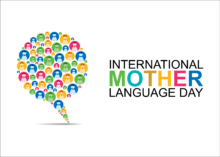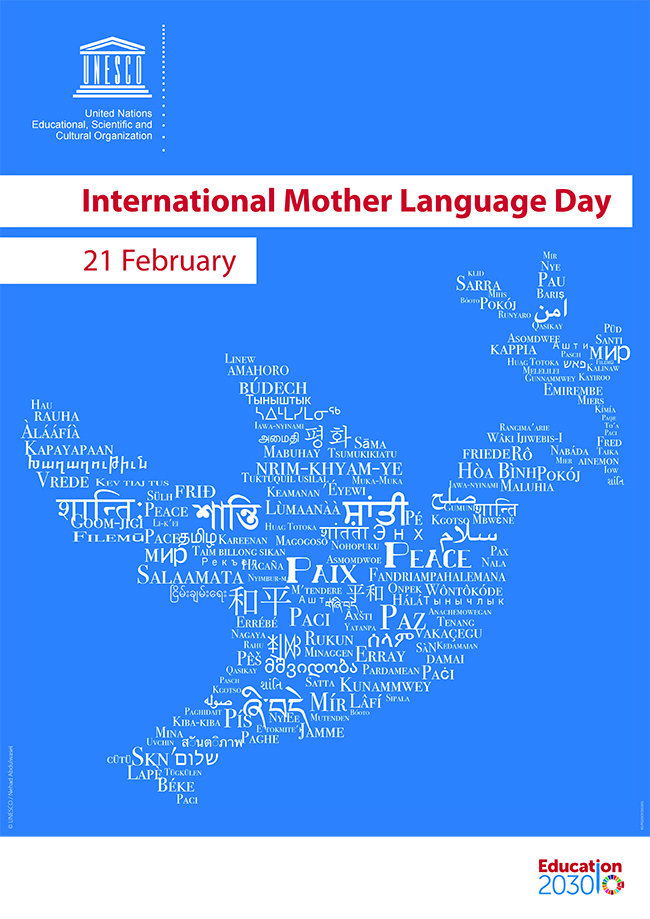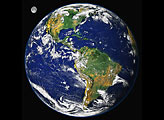2022
MULTILINGUALISM - The New Global Competence Standard: Mother Language + 2
21 February 2022, 11:00 am - 12:45 pm
In elaborating on the Sustainable Development Goals in 2015, the United Nations asserted the importance of global citizenship education, a process enhanced by the acquisition of languages other than one's own. That acquisition also serves a key element in CTAUN's mission "to incorporate global awareness into curricula and school activities at all levels."

Presenters included:
MARK WOODWORTH HARRIS President Emeritus, Berlitz & ELS Language Services; Creator and Co-Founder - Many Languages, One World (MLOW).
ALEKSEY TSYKAREV Chairperson, Center for Support of Indigenous Peoples and Civic Diplomacy “Young Karelia” (NGO) under consultative status with UNESCO; Expert and Vice Chair, UN Permanent Forum on Indigenous Issues; Member of Task Force, UN International Decade of Indigenous Languages 2022-2031
ARBRE AGULLO GUERRA Expert in Catalan
Dr. KATHLEEN STEIN-SMITH Professor of French and a leading advocate for the study of foreign languages in the USA
and three "Many Languages One World" alumni:
ELISA CAPOBIANCO "Many Languages, One World" alumna from Italy -- LANGUAGES: Italian, French, English
SARA JEFFAR "Many Languages, One World" alumna from Morocco -- LANGUAGES: Arabic, French, English, Italian
GUGULETHU JEMAINE "Many Languages, One World" alumna from Zimbabwe -- LANGUAGES: Shona and Ndebele (mother languages), English (medium of instruction), Mandarin Chinese, Russian
RAMU DAMODARAN conducted the Q&A session.
A recording of the webinar can be viewed HERE.
Webinar Summary:
Anne-Marie Carlson, leader of the Committee on Teaching About the United Nations (CTAUN), welcomed the 311 registrants from 52 countries on this International Mother Language Day, the object of which is to preserve different cultures and languages to foster tolerance and peace. She greeted everyone in Norwegian, which is the language of her family, and in Bahasa Indonesia, the national language of Indonesia where she lived and taught for close to 3 years. She introduced Mark Harris as the inspiration for today’s webinar.
Mark W. Harris, a member of CTAUN’s Advisory Council and the co-founder of “Many Languages, One World,” spoke of language as the DNA of culture, since it dictates and defines how we experience our lives and how we understand the world around us. He added we should be grateful for our mother language and respect those of others.
He offered many statistics on national and international education policies that encourage multilingualism or can, unfortunately, suppress native languages. He acknowledged the value of the use of the internet in the learning of language and believes that today one needs their mother language plus two others because of our global connectiveness.
Aleksei Tsykarev has been a lifetime activist for the rights of indigenous peoples in Russia. Presently he serves as the Vice Chair of the UN Task Force for the International Decade of Indigenous Languages (2022-2032).
He welcomed everyone in his own language, Karelian, which is one of the many indigenous languages of Russia. He talked about the connection between language and culture. He shared the proposed work of the United Nations Task Force during the “Decade.” which will be to draw attention to the critical loss of indigenous languages and the urgent need to preserve, revitalize, and promote these languages by taking steps at the national and international levels.
He told of the work that the United Nations is doing now – giving technical advice, facilitating dialogue, developing studies that focus on education, encouraging decision making, and highlighting the role of indigenous language and culture.
He ended by inviting all to the upcoming ceremonies for the International Decade of Indigenous Languages.
Arbre Agullo Guerra, a speaker of the language, Catala, had been interviewed by Mark Harris. Citing the suppression of this native language as an example of politics, Mark showed in slides how although it was widely used in culture and commerce until the year 1700, a decree of Louis XIV completely outlawed its use. 375 years of repression followed, but Catala was secretly spoken in the villages and countryside. In 1975 Catalonia became an autonomous state, and teachers could teach Catala, but not many knew it. For this reason and the fact that young people use English, Catala may not flourish.
Kathleen Stein-Smith, author and college professor, began by acknowledging that Mark Harris and “Many Languages, One World” had a “profound impact” on her professional life. She then pointed out that the United States has a foreign language deficit – only 1 in 5 students have the opportunity to study language; she called for advocacy efforts to influence government policy, mentioned organizations that promote language learning, and presented two “must read” books. Speaking of the importance of multilingualism, she noted that it is essential to the work of the United Nations, is important to the present and future of young people, and is a key to fostering harmony.
Mark Harris introduced the next segment by giving a history of “Many Languages, One World.” It was created as an annual event that would involve university students around the world in an essay contest that would challenge them and exhibit the relevance and importance of multilingualism and global citizenship. Students had to present an essay on a topic of international importance written in an acquired language – not their own or one they had been schooled in. The three young women who spoke are winners of this contest.
Sara Jeffar has a PhD in Literature and is studying for a Master in Poli Sci at the University of Milan. Her language journey – which she describes as joyful and rich - began with her mother language of Arabic and continued wiith French, English, Japanese, German, Italian and Turkish. She believes that learning language can build identity, heal trauma, nurture emotional intelligence, help to understand the “other,” understand one’s self, support scientific research, facilitate peace and build respect.
Gugulethu Jemaine is from Zimbabwe and learned Chinese, English and Russian in addition to the tribal languages of Shona and Ndebele. She believes that if one puts in time, interest and effort, that one can learn a language and also learn about its environment and culture. She feels that language study has expanded her mind; it also gives people access to job opportunities and communities, the ability to hold effective cultural dialogue, and to gain true respect for other cultures.
Elisa Capobianco has a MA in Performing Arts from the University of Rome; she works in TV production for ASvIS, a network that fosters the 2030 Agenda. Elisa speaks English, French and Italian. Her study of language plunged her into a new environment and changed her way of looking at life and the world. She realized she has a responsibility as both a citizen of Italy – a European – and as a citizen of the world- to plan for the peace, the planet and prosperity.
Ramu Damodaran moderated the Question and Answer segment - here are a few samples:
He asked Aleksei about the role of creativity as a vehicle for communicating the richness of language. Aleksei replied that indigenous language speakers contribute to the local economy through their craftsmanship.
He asked Kathleen Stein-Smith about the role of technology in the learning of language. She answered that on- line learning can help to solve accessibility and availability problems for both new learners and those who wish to improve their English skills.
He asked Sara Jeffar how music has enriched her study of language. She replied that she began to study Japanese because the words of a song intrigued her. She started to learn English in the same manner.
He asked Gugelethu how she feels when a stranger speaks her language. She said that she feels grateful because it means the person acknowledges her as a person and shows interest in her culture.
He asked Elisa how language has helped her identify herself. She said that it helped her realize that she had a responsibility not only to her region of Europe but to the world. For the full Q&A you can view the video.
Mark Harris gave closing remarks.
Anne-Marie Carlson announced the next CTAUN webinar will be on Friday, April 22, 2022 which is Earth Day. The topic will be global heating and how we can mend a fractured planet.
She also recommended Virtual Tours of the United Nations, which can be arranged at un.org/visit
February 21 has been designated by the UN as INTERNATIONAL MOTHER LANGUAGE DAY

UNESCO
 CLIMATE CHANGE AND GLOBAL HEATING: What we can do together to repair our broken planet.
CLIMATE CHANGE AND GLOBAL HEATING: What we can do together to repair our broken planet.

Friday, 22 April - Earth Day.
This WEBINAR aimed to provide an overview of current Climate challenges, recommendations for actions by individuals and institutions, and – most crucially - the important role of teachers and young people in raising awareness.
Anne-Marie Carlson, CTAUN Co-Chair, welcomed the 275 registrants from 22 countries and pointed out that global heating affects all aspects of human life. She introduced RAMU DAMODARAN , (retired) leader of United Nations Academic Impact Initiative, as Moderator of the webinar and EILEEN VENEZIA, CTAUN Vice-Chair as Chair of the webinar.
Following was the video appearance of Frankie the dinosaur (using computer generated technology – CGI) in the UN’s General Assembly Hall whose message was: “Going extinct is a bad thing…Start making changes (to address the climate crisis). It’s now or never.”
Referring to what he labels “global heating,” keynote speaker FRANZ BAUMANN, Former Assistant Secretary-General of the UN, called it “the greatest challenge humanity has ever faced,” and, alluding to the war in Ukraine, an even more important challenge than war. It is a challenge that can only be solved by cooperation among nations. Slides illustrated the effects that fossil fuel emissions have on the atmosphere. He pointed out that as far back as 1996 - the UN had already introduced a resolution calling for “protection of the global climate” with specific reference to greenhouse gases. He also referred to the most recent report of the International Panel on Climate Change (IPCC) – a special commission of experts established by the UN. In this report it is made clear that urgent action is needed. Professor Baumann mentioned responses to the problem of global heating as mitigation, adaptation and suffering, and explained what each term meant. He stressed the importance of activism by young people and mentioned Greta Thunberg’s insistence on raising awareness about the problem and taking action.
Moderator Ramu Damodaran dialogued with KATIE WORTH, author of Miseducation-How Climate Change is Taught in America. She believes it is no accident that one in four students do not believe in climate change, and showed that much of this is caused by the propaganda used by big fossil fuel companies, for example by influencing content included in textbooks. Children should have the facts; many educators are working on how to best teach them so that they along with their parents will become more aware.
DONNA GOODMAN, former UNICEF staff member and long-time educator on environment shared her belief that many children are unaware of the connection between nature and themselves, so they must learn to interact with nature. This can happen through effective teaching in the classroom, and also through books. Ms. Goodman spoke about her work ensuring that children have a voice.
KIANA JOY YABUT is a student at the University of Guam and a representative at the Guam Youth Congress. For Guam, a region dependent on tourism, typhoons and air pollution are important issues. Ms. Yabut said that delaying action on climate change - “an everything issue” - is like putting a pot on a back burner. Sooner or later, it will overflow; to ensure our future, we must prevent that spill. She shared examples of actions young people are taking.
In the Student-led Question and Answer segment, ( GIANNA BARCIA , PETER BROSNAN, SEAN O'HAGAN ) the following ideas were presented.
- Our life style, behavior and survival skills are all affected by our location in the world. The rich have ways to adapt, the poor do not.
- Ways to mitigate climate change also depend on where you live. Water, trees and lifestyle are important.
- Children and young persons must be aware of their local environment and have survival skills. Greta Thunberg is important because she moved the problem to the center of attention.
- Knowledge is power; therefore, it is important that every mode of communication be used to push the agenda and make the facts and the necessity for action to mitigate climate change known. Adults will react if they feel empowered.
- Climate change is having an effect on our health since we are encroaching on nature. There is an increase in zoonotic diseases.
To a question posed by a viewer, Katie Worth stressed the importance of local political action, especially by the young who will be the most affected. She also cited the influence that lobbyists for the oil industry in Texas had on the establishment of state emissions standards. She urged the use of wind and sun as energy sources.
Ms. Carlson thanked everyone for their many contributions and stressed the importance of greater attention to and involvement in the protection of our planet and its resources.
Watch the VIDEO
As far back as 1998 the UN General Assembly passed General Assembly resolution A/43/53 "Protection of global climate for present and future generations of mankind" which reads, in part:
"Welcoming with appreciation the initiative taken by the Government of Malta in proposing for consideration by the Assembly the item entitled “Conservation of climate as part of the common heritage of mankind”
Concerned that certain human activities could change global climate patterns, threatening present and future generations with potentially severe economic and social consequences.
Noting with concern that the emerging evidence indicates that continued growth in atmospheric concentrations of “greenhouse” gases could produce global warming with an eventual rise in sea levels the effects of which could be disastrous for mankind if timely steps are not taken at all levels...."
For the full resolution text in the original document go to https://undocs.org/A/res/43/53

The recent IPCC (International Panel on Climate Change) report provides details of where we are today:
https://report.ipcc.ch/ar6wg2/pdf/IPCC_AR6_WGII_SummaryForPolicymakers.pdf
